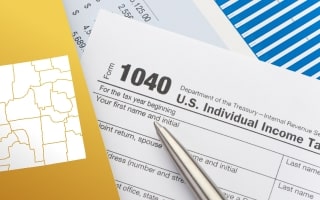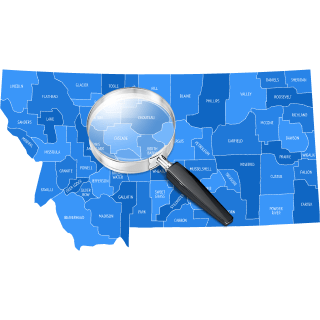Property Tax Records in Montana

When you purchase a piece of real estate, the county you reside in will send a property tax bill through the mail every year. Your property taxes are calculated based on the effective tax rate in your county. The average tax rate in Montana is 0.74%.
Before your county can estimate your taxes, an assessor will need to appraise your property. They'll first identify the current market value based on the sales of comparable properties in your county. Once they determine the market value, they can calculate the assessed value, which is the amount that the tax rate is applied to.
There are 56 counties in Montana, each of which has a different property tax rate. Taxes are billed every year. However, you can pay in multiple installments that are due on May 31 and November 30. Most homeowners choose to pay these taxes when they make their monthly mortgage payments.
Montana has a unique history with property taxes. Before 1972, the State Board of Equalization in each county was responsible for assessing property values. While property values were required by state law to be updated regularly, some counties didn't adhere to these guidelines. Once the Montana State Constitution was passed in 1972, the responsibility for property valuations shifted from the counties to the state.
Property Tax Assessment in Montana

The taxes you pay on your home in Montana are based on the county's tax rate as well as the taxable value of your property. While a home's taxable or assessed value is mainly based on its market value, Montana uses a more complex formula to calculate the taxes you'll need to pay every year.
State assessors are tasked with reappraising properties every two years. Before 2015, this process only took place every six years. The purpose of a reappraisal is to identify the current market value, which can increase or decrease because of many different factors. If the new value is higher than the previous one, the difference will be applied evenly over the next two years.
Even though the state handles property appraisals, cities and counties set the tax rates. Keep in mind that some of these taxes will be used to support the state's education system. Like most states, Montana tax rates are displayed in mills. One mill is the same as $1 per $1,000 in taxable value.
To understand how much you'll pay in property taxes for the year, let's say that your home has a market value of $250,000. In Montana, the assessment value is 100% of the market value, which means that it will also be $250,000. If the county you live in has a millage rate of 20, your annual property taxes will amount to $5,000.
However, there are some Montana property tax exemptions and deductions that could reduce your property tax bill. In Cascade County, the average tax bill ranges from $1,226 to $2,761. The average effective tax rates for the most populous Montana counties are:
- Yellowstone County: 1.04%
- Gallatin County: 0.89%
- Missoula County: 1.24%
- Flathead County: 0.91%
- Cascade County: 1.16%
Calculate Montana Taxes
Smart homeowners and real estate investors use a Montana property tax calculator to better understand how property taxes are calculated in the state. This tool simplifies the process by allowing users to enter key property details, such as location, assessed value, and property type, to estimate their annual tax assessment and liability based on statewide and local mill levies. In Montana, property taxes are calculated using the taxable market value multiplied by a tax rate specific to the property's classification, then adjusted by the total local mill levy.
A Montana property tax calculator can also help identify available exemptions and tax relief programs. Montana offers property tax assistance through programs like the Property Tax Assistance Program (PTAP), which provides reduced taxes for qualifying low-income homeowners, and the Elderly Homeowner/Renter Credit, which offers income-based refunds for seniors. Other exemptions may apply to veterans, disabled individuals, and agricultural properties.
using our property tax calculator.
Montana Property Tax Records: What Are They?

The property taxes you pay every year are collected by the county you live in. Local governments use property tax collections as the main source of revenues for public services. The types of public services that are covered by property taxes include the following:
-
Public schools
-
Health and social services
-
Bridges and roads
-
Fire protection
-
Police protection
If you are interested in buying a home in Montana and want to know more about the amount of property taxes the owner typically pays, you should be able to find public records of these taxes and how much they've increased over the years. All property tax records are available to the public, which is why each county has created an online platform that provides easy access to this data.
When you use one of these systems, you can search for properties in Montana with parameters like the owner's name, property number, street name, tax code, geocode, and legal address. If you input the correct information, you'll receive a tax report that includes a lot of details about the property. Some of the information you'll be able to review includes the following:
-
Primary owner name
-
Property address
-
Township
-
Subdivision
-
Legal description
-
Map of property
-
Billing info for property taxes
-
Nearby schools
-
Owners for the past 10 years
-
Full tax statement, which includes a breakdown of where the money goes
-
Assessment value and market value
-
Description of how property taxes were calculated
-
Billing history
-
Mill levy
-
Jurisdictional information
-
Details about the home, including everything from total square footage to recent renovations
Property Tax Exemptions and Deductions in Montana

One reason Montana's effective property tax rate is lower than the national average is the tax exemptions and deductions that homeowners have access to. The main exemptions in Montana are available to low-income households, elderly homeowners, and disabled veterans.
These tax breaks offer different benefits. In most states, tax exemptions are designed to reduce a property's assessed value. However, the tax breaks available in Montana either provide a credit or reduce the property tax rate. In general, Montana property tax deductions are easy to apply for.
Property Tax Assistance Program: The Property Tax Assistance Program is designed to reduce property taxes for homeowners who have a limited or fixed income. This program works by effectively reducing the county's property tax rate. Keep in mind that it can only be applied to the initial $350,000 of your home's market value. Your current marriage status and income level determine which reduction percentage you'll qualify for.
To qualify for this deduction, you must own the home and live there for at least seven months during the year. Your income can't exceed $27,621 as a single individual or $37,019 if you're married. Depending on your income level, the reduction can be 30%, 50%, or 80% of the existing tax rate. For example, if you're a single tax filer who earns between $0 to $13,590, you'll qualify for the 80% reduction.
Montana Disabled Veteran Assistance Program: The Montana Disabled Veterans Assistance Program is designed to help disabled veterans lower their property tax rates. This exemption is only available to veterans who have 100% disability because of a service-related injury.
To qualify for this exemption, you must own and live in the home. You'll also need to provide a letter from the Department of Veterans Affairs that proves your disability status. This specific exemption has income limits that you must meet to qualify. If you're a single filer, the maximum income is $59,554. For married or head-of-household individuals, the limit is $68,705. Unmarried surviving spouses can qualify if their annual income is under $51,911.
If you qualify for this exemption, the tax rate reduction can range from 50%-100%. For example, a single filer with an income between $0 to $45,803 won't pay property taxes. If you're a single filer with an income between $54,964 and $59,554, you'll qualify for a 50% reduction.
Elderly Homeowner Tax Credit: If you qualify for the Elderly Homeowner Tax Credit, you can exclude $12,600 of your home's assessed value from property taxes. The maximum credit you'll have access to is $1,150. This is available to homeowners who are at least 62 years old.
To qualify, your household income must be lower than $45,000. You'll also need to live in Montana for nine or more months during the year. The amount you receive with this credit depends on your household income as well as your property tax.
How To Search Property Tax Records in Montana

When you're looking for property records in Montana, there are a few methods you can use, which include the state website, your county website, and a third-party tool. Montana's official state website makes it easy for the public to look up property report cards.
When you access this website, you can search for a home by entering the property number, owner's name, assessment code, or address. While these reports aren't as comprehensive as the county ones, you'll still get information like legal description, owner name, and tax amounts.
If you decide to use your county's website, you can conduct your search with parameters like street address and geocode. Once you find the home you're looking for, you'll receive exhaustive tax records and property information. For example, these reports go into detail about how property tax revenues are divided among the many taxing districts in the county.
You can also use third-party tools like PropertyChecker. This tool gives you access to property tax records as well as deed information. Once you enter an address or the phone number, you'll be able to find homeowners name and also informations like:
-
Loan records
-
Deeds
-
Lien records
-
Property information
-
Purchase history
-
Building permits
-
Foreclosures
-
Neighborhood info
-
Assessed value and market value
How To Appeal Property Taxes in Montana

When you own a home in Montana, you'll receive your assessment notice in June. If you think that the assessed value or market value is inaccurate, you can appeal it. Montana provides homeowners with a structured appeals process. If you can provide evidence that your home's assessed value is incorrect, you may be able to have it reduced. Use the following guidelines when appealing your property taxes.
Step 1: After you receive your Montana property tax assessment notice in the mail, you'll have 30 days to file an appeal with the County Tax Appeal Board. The Board secretary will then schedule a hearing, which should take place between July 1 and December 31. During this hearing, you can present evidence. The Board's decision will be mailed to you after the hearing takes place.
Step 2: If you don't agree with the Board's decision, you can file another appeal with the Montana Tax Appeal Board. You must submit the appeal within 30 days after you receive the county's decision. Make sure you include your reasons for appeal. All Montana Tax Appeal Board hearings are held at 560 N. Park Ave., Suite 201, in Helena.
Step 3: You'll receive a written decision from the Montana Tax Appeal Board. You can request judicial review of this decision in your district. A judicial review is available 60 days after the Montana Tax Appeal Board makes its ruling.
How Property Tax Records Impact Real Estate Transactions in Montana

Depending on where you live and the value of the home you buy, you may be required to pay thousands of dollars in annual property taxes. A tax bill of $2,400 can add $200 to every monthly mortgage payment you make. Buyers and investors must consider property taxes when taking part in real estate transactions.
Buyers can use tax records to estimate their property taxes before they make an offer on a Montana home. If a seller lives in a county with a high property tax rate, they might need to make some concessions to receive offers from prospective buyers.
As for investors, property taxes can add a lot to mortgage payments, which can make it more challenging for them to earn profits. When you evaluate an investment, property tax records provide transparency about the amount of taxes you'll likely pay once you purchase the property.
Investors can also buy tax liens. When a Montana homeowner doesn't pay their property taxes on time, they will become delinquent. The homeowner then receives a 2% penalty. For every month that they don't repay their taxes, interest will accumulate. After six months, the county will attach a tax lien to the delinquent property.
These liens are sold to investors in tax sales. When an investor purchases a tax lien, they'll need to pay the total tax bill as well as any interest. The investor can then collect interest and payments from the property owner. Eventually, they may be able to foreclose on the property or take ownership of it.
Free Montana Property Tax Lookup
Tax Records Please wait...
Property Tax Guide
- Property Tax Records in Montana
- Property Tax Assessment in Montana
- Montana Property Tax Records: What Are They?
- Property Tax Exemptions and Deductions in Montana
- How To Search Property Tax Records in Montana
- How To Appeal Property Taxes in Montana
- How Property Tax Records Impact Real Estate Transactions in Montana
Instant Access to Montana Property Records
- Owner(s)
- Deed Records
- Loans & Liens
- Values
- Taxes
- Building Permits
- Purchase History
- Property Details
- And More!
Free Montana Property Tax Lookup
Tax Records Please wait...
Property Tax Guide
- Property Tax Records in Montana
- Property Tax Assessment in Montana
- Montana Property Tax Records: What Are They?
- Property Tax Exemptions and Deductions in Montana
- How To Search Property Tax Records in Montana
- How To Appeal Property Taxes in Montana
- How Property Tax Records Impact Real Estate Transactions in Montana